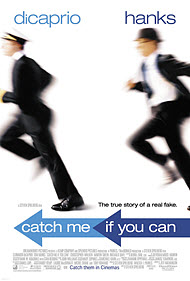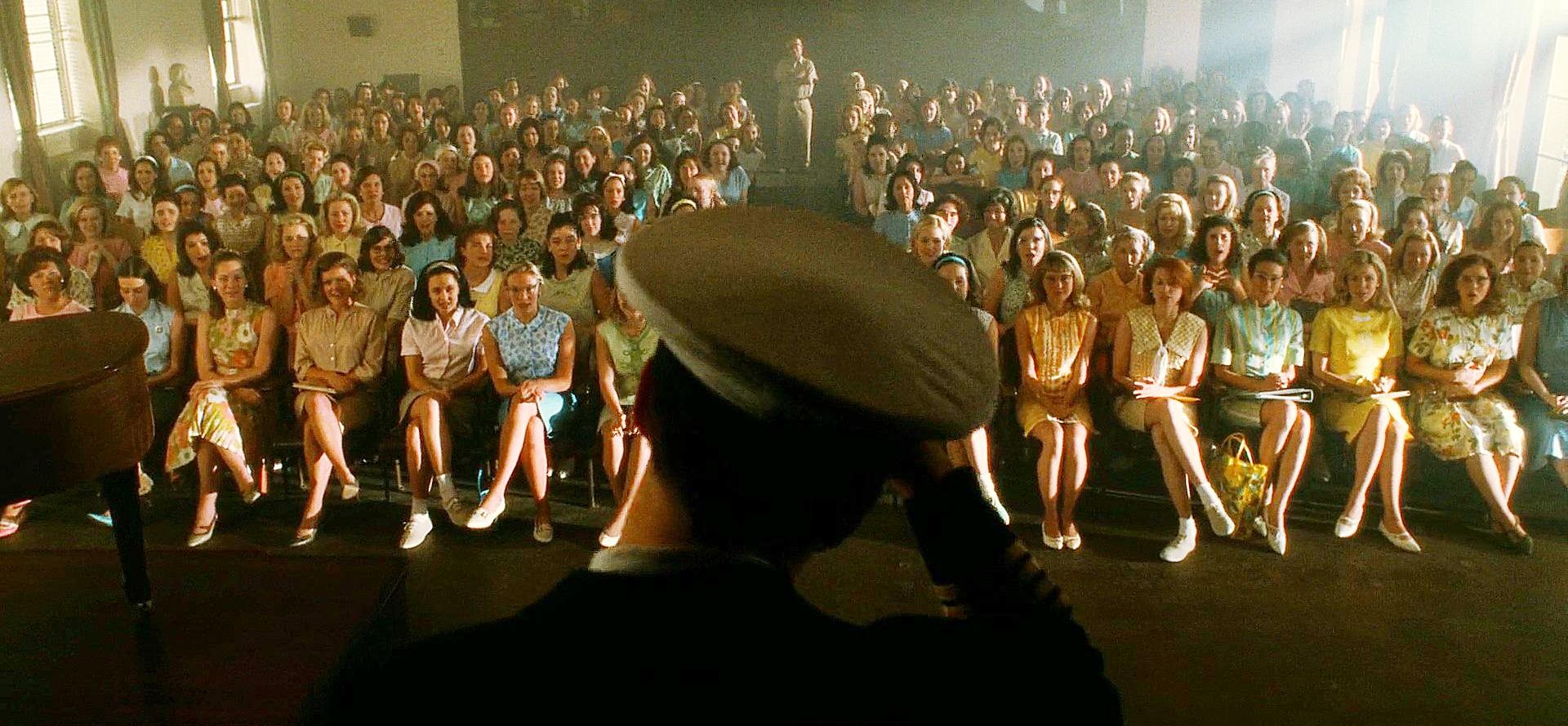Catch Me If You Can
 for some sexual content and brief language.
for some sexual content and brief language.
Reviewed by: Halyna Barannik
CONTRIBUTOR
| Moral Rating: | Average |
| Moviemaking Quality: |
|
| Primary Audience: | Teens Adults |
| Genre: | Biography Crime Drama |
| Length: | 2 hr. 21 min. |
| Year of Release: | 2002 |
| USA Release: |
December 25, 2002 (wide—3,156 theaters) |



What does the Bible say about lying and deception?
What does the Bible say about truth?
DISCUSSION:
1. The moral structure of the home will be the foundation upon which a child lives his or her life. Consider the moral messages many children receive from their parents today. What will the future society look like based on today’s parents?
2. If Frank Jr. was attempting to provide the resources for his parent to reunite and recreate his home, would you excuse his behavior or still hold him accountable? Why?
3. The nature of fraud is to tell a person what they want to hear. How did Frank Jr. do that to the people in his life and why is this a damaging behavior? Have you ever defrauded a person for some personal gain? What happened to the relationship?
4. In what way was Hanratty as disturbed a person as Frank Jr.? What does both a life of crime and a life of crime-fighting do to the soul of a person?
—Denny and Hal, Cinemainfocus
| Featuring |
|---|
|
Leonardo DiCaprio … Frank Abagnale Jr. Tom Hanks, … Carl Hanratty Christopher Walken … Frank Abagnale Martin Sheen … Roger Strong Jennifer Garner … Cheryl Ann Amy Adams … Brenda Strong James Brolin … Jack Barnes Elizabeth Banks … Lucy Brian Howe … Earl Amdursky Nathalie Baye … Paula Abagnale Frank John Hughes … Tom Fox Brandon Keener … Pilot Jaime Ray Newman … Monica Ellen Pompeo … Marci Amy Acker … Miggy Sarah Lancaster … Riverbend Woman See all » |
| Director |
|
Steven Spielberg |
| Producer |
| Steven Spielberg, Walter F. Parkes |
| Distributor |
I go to movies to be entertained. I went to see “Catch Me If You Can” because it received high review ratings, and, based on a true story, promised a content that would surely be interesting. It was indeed an intriguing film, and the two plus hours slipped by quickly. That the story is well-told cannot be denied. There is a good screenplay that clips along at a good pace, good acting, good editing that presents the rapid action clearly. But what does it all mean spiritually?
Frank Abagnale, Jr. (Leonardo DiCaprio) is the son of Frank Abagnale, Sr. (Christopher Walken), and the apple does not fall far from the tree. The father is in trouble with the IRS and doesn’t express any remorse for his wrongdoing. In fact, he wants to sue the government for harassing him. Somehow Frank Junior catches this felony bug and engages, at the unbelievably young age of 16, in a life of shocking, colorful, flagrant fraud. The psychological stimulus seems to be his extreme despair at the divorce of his parents, and not just a desire to have money and climb out of the poverty that his father’s problems have created.
No only does Frank Jr. forge checks, but he embarks on a series of professions for which he has not a speck of education or training. He gets through this con life by sheer gall and creative intelligence. And he does all this successfully, at least for awhile. There is a delay between the execution of his crimes (impersonating an airline pilot, a doctor and a lawyer) and government authorities catching onto these crimes. In hot pursuit of him, once his spree of bank forgeries and other fraud is discovered, is FBI agent Carl Hanratty (Tom Hanks).
The movie takes us through hoops, as Frank performs his tricks and Carl tries to find him. He is, of course, eventually caught. The film is based on the story as told by the real Frank Abagnale. But does he have any remorse for the harm his fraud has caused? This issue is not at all clear in the movie. The film is entertaining, sometimes sad, but ultimately leaves a big moral question mark. The unquestioned answers are underlined by the fact, as stated at the end of the film, that Frank has been living a normal life for decades, with a wife and children, and is paid millions of dollars by institutions for helping them solve other bank fraud cases.
The morally unclear ending left me somewhat dissatisfied. The real Frank is now touring the country telling stories of his criminal escapades, and receiving celebrity status, thanks to this movie. The issue of justice is somehow hanging in mid-air for me. My Christian perspective on the moral of the story is frustrated and unresolved. Could this be an instance of God’s overriding mercy that restores Frank’s life to him and the movie simply failed to present all the necessary spiritual ingredients for one to draw this conclusion? I really don’t know. However, as entertainment, the movie succeeds grandly.
Editor’s Note: For an interesting read (and to contrast the exaggerations brought forth in this film), please see Frank Abagnale’s personal site at http://abagnale.com/comments.htm


He also, on several occasions, wanted to “restore” unto his father everything that he had lost… but only God can do that. We as Christians have to see God in everything, be it good or bad. I saw God moving all in this picture. Just because Frank never acknowledged the Lord God or maybe didn’t even know who He was doesn’t mean God didn’t know him! And though he may still today think he was “lucky”, “smart” or “slick” the truth in the matter is that he was blessed.
After all God is the God of ANOTHER chance!
[Average / 4½]
I still consider it a good movie, personally considering Tom Hanks is a brilliant actor. It was overall, positive.
[Average / 4]
[Average / 3½]
[5]
[5]
[Better than Average / 4½]
It is rich entertainment, but I was very happy to find that it was much, much more! The historical value makes it even more praiseworthy.
There was some language and innuendo. The innuendo is not specifically condoned, as it’s the villain who does it. However, since the woman, who was not a villain, yielded to the villain’s seduction and that was not condemned, I think I’ll just have to give the film a morality rating of “Average.” But that rating is for the film’s overall content, all things taken into consideration. In the end, that detail is unessential to the plot, as is the little amount of language.
Again, this is one of the most inspiring films I’ve ever seen. In my opinion, because of the historical value, it gets close to the borderline of must-see.
Moral rating: Average / Moviemaking quality: 5
[Average / 3]
[Average / 3]
[Extremely Offensive / 5]
Tom Hank’s Handratty stumbles over potato chips in the carpet and doesn’t know a suspect when he confronts him. This film gets good laughs at the expense of the truth and real life reputations. Contrary to what some reviewers thought, this film clearly attempted to develop a serious plot undercurrent for DiCaprio’s character that was based on his parents’ life tragedies related to income tax evasion, adultery, divorce and remarriage.
But it’s a big stretch to think that the failure of your parents’ marriage turns you into a check forger and fabulous impostor. Moving past these disappointments, the larger failure of this film is in lack of development of how it was that Frank Abagnale was so gifted and brilliant that he could learn enough to pass the bar in 2 weeks, fly commercial jets and pass himself off successfully as a Harvard educated pediatrician. These things make the real life person quite fascinating.
Frankly, I thought that Leonardo DiCaprio just played himself as usual, as most ordinary actors do. And there’s nothing particularly brilliant about him. The only really great acting job in this movie is Christopher Walken’s role as Frank Sr.
[Average / 3]
Moral rating: Offensive / Moviemaking quality: 4
[Very Offensive / 4]
Aside from that, this movie has a lot to offer if you are in the mood for a laugh out loud comedy. I would recommend this film for viewers in high school or older.
[Average / 3½]
[Average / 3½]
[Better than Average / 4½]
[Average / 4]
I haven’t seen the film, but I’ve read the book, and heard a speech. The book shows that Frank began stealing to support his sex habit. What neither the book nor the film tell, is that he repaid all whom he stole from. “Today, no one is out a penney.” Get the audio of the speech at Focus on the Family. He does not at any time express any religious faith.


All three celebrities involved with this picture have done better work earlier this year. Hanks had “Road to Perdition,” Spielberg had “Minority Report” and Dicaprio has “Gangs of New York.” I’m not trying to say that this was a bad movie, it just wasn’t up to the standard I was holding for it. Both Hanks and DiCaprio were fantastic, and they shared the movie’s best scenes together. I can say that whenever they were together, I never got bored. Their scenes together were just great. See all »
My Ratings: [Better than Average / 3½]